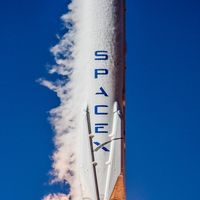The Space Race of Words: Musk, Trump, and the Future of SpaceX
June 9, 2025, 9:41 am

Location: United States, Illinois, Chicago
Employees: 10001+
Founded date: 1916
Total raised: $25.01B

Location: United States, District of Columbia, Washington
Employees: 5001-10000
Founded date: 2002
Total raised: $7.53B

Location: United States, Maryland, Greenbelt
Employees: 10001+
Founded date: 1958
Total raised: $25.7B
In the ever-evolving landscape of American politics and technology, few figures stand out like Elon Musk and Donald Trump. Their recent clash over SpaceX's Dragon spacecraft has become a spectacle, a modern-day duel that intertwines business, politics, and the future of space exploration. This confrontation raises questions not just about contracts and spacecraft, but about the very nature of power in America today.
Elon Musk, the visionary behind SpaceX, recently announced plans to decommission the Dragon spacecraft. This decision came swiftly after President Trump threatened to cancel government contracts with Musk's companies. The Dragon spacecraft is no ordinary vehicle; it is the lifeline for NASA astronauts traveling to and from the International Space Station (ISS). Musk's initial declaration sent shockwaves through the aerospace community, highlighting the precarious balance between private enterprise and government oversight.
But within hours, Musk backtracked. A user on X, the social media platform formerly known as Twitter, urged him to reconsider. Musk, ever the pragmatist, took the advice. "Good advice. Ok, we won’t decommission Dragon," he tweeted. This rapid reversal showcased Musk's unique relationship with social media, where a single tweet can shift the course of a major decision. It also illustrated the fragility of his position in the face of political pressure.
The roots of this conflict run deep. Musk's criticism of Trump's tax bill ignited a war of words. Trump, never one to shy away from a fight, responded with threats to cut off Musk's government contracts. The stakes are high. SpaceX has received over $20 billion in contracts from NASA and the Pentagon since 2008. A cancellation could cripple the company and stall U.S. progress in space exploration.
The Dragon spacecraft is not just a vehicle; it represents a new era in American space travel. It ended nearly a decade of reliance on Russian Soyuz rockets after the Space Shuttle program was retired in 2011. The Crew Dragon variant has successfully transported astronauts to the ISS, while also serving private missions. Its decommissioning would leave a significant gap in the U.S. space program.
Musk's relationship with Trump has been complex. Once a close advisor, Musk's support for Trump has waned, especially as political tensions rise. Musk's claim that "without me, Trump would have lost the election" underscores the shifting dynamics. This is not just a battle over contracts; it is a struggle for influence and recognition.
NASA, meanwhile, remains caught in the crossfire. The agency's spokesperson reiterated its commitment to the President's vision for space. Yet, the uncertainty surrounding SpaceX's future raises questions about NASA's ability to fulfill its missions. The agency relies heavily on private partners like SpaceX to achieve its goals. If contracts are cut, the implications could be dire.
The drama surrounding Musk and Trump is emblematic of a larger trend in American politics. The lines between business and government are increasingly blurred. Musk's ability to influence policy through social media reflects a new era of communication, where public opinion can sway decisions in real-time. This dynamic poses risks and rewards. While it empowers individuals, it also creates volatility.
The question remains: how serious is Musk about decommissioning the Dragon? His initial announcement seemed definitive, yet the quick reversal suggests a more calculated approach. Musk is known for his bold statements, but he is also a savvy businessman. He understands the importance of maintaining government contracts for the survival of SpaceX.
As the feud escalates, the implications extend beyond Musk and Trump. The future of American space exploration hangs in the balance. SpaceX is currently testing its Starship rocket, which aims to take humanity to Mars. However, the recent failures in testing raise concerns about the company's readiness for such ambitious goals. The stakes are high, and the pressure is mounting.
In the background, the international space race continues. Other nations are investing heavily in their space programs, seeking to establish dominance in this new frontier. The U.S. must maintain its leadership position, and that requires a stable partnership with private companies like SpaceX. The potential fallout from this feud could hinder progress and allow competitors to gain ground.
As Musk and Trump continue their verbal sparring, the world watches closely. The outcome of this conflict could reshape the future of space exploration. Will Musk's Dragon soar to new heights, or will it be grounded by political machinations? The answer remains uncertain, but one thing is clear: the battle for the stars is as much about words as it is about rockets.
In conclusion, the clash between Musk and Trump is more than a personal feud; it is a reflection of the complexities of modern governance and business. The fate of the Dragon spacecraft symbolizes the broader challenges facing the U.S. in maintaining its position in the global space race. As we look to the stars, we must also navigate the turbulent waters of politics and power. The future of space exploration depends on it.
Elon Musk, the visionary behind SpaceX, recently announced plans to decommission the Dragon spacecraft. This decision came swiftly after President Trump threatened to cancel government contracts with Musk's companies. The Dragon spacecraft is no ordinary vehicle; it is the lifeline for NASA astronauts traveling to and from the International Space Station (ISS). Musk's initial declaration sent shockwaves through the aerospace community, highlighting the precarious balance between private enterprise and government oversight.
But within hours, Musk backtracked. A user on X, the social media platform formerly known as Twitter, urged him to reconsider. Musk, ever the pragmatist, took the advice. "Good advice. Ok, we won’t decommission Dragon," he tweeted. This rapid reversal showcased Musk's unique relationship with social media, where a single tweet can shift the course of a major decision. It also illustrated the fragility of his position in the face of political pressure.
The roots of this conflict run deep. Musk's criticism of Trump's tax bill ignited a war of words. Trump, never one to shy away from a fight, responded with threats to cut off Musk's government contracts. The stakes are high. SpaceX has received over $20 billion in contracts from NASA and the Pentagon since 2008. A cancellation could cripple the company and stall U.S. progress in space exploration.
The Dragon spacecraft is not just a vehicle; it represents a new era in American space travel. It ended nearly a decade of reliance on Russian Soyuz rockets after the Space Shuttle program was retired in 2011. The Crew Dragon variant has successfully transported astronauts to the ISS, while also serving private missions. Its decommissioning would leave a significant gap in the U.S. space program.
Musk's relationship with Trump has been complex. Once a close advisor, Musk's support for Trump has waned, especially as political tensions rise. Musk's claim that "without me, Trump would have lost the election" underscores the shifting dynamics. This is not just a battle over contracts; it is a struggle for influence and recognition.
NASA, meanwhile, remains caught in the crossfire. The agency's spokesperson reiterated its commitment to the President's vision for space. Yet, the uncertainty surrounding SpaceX's future raises questions about NASA's ability to fulfill its missions. The agency relies heavily on private partners like SpaceX to achieve its goals. If contracts are cut, the implications could be dire.
The drama surrounding Musk and Trump is emblematic of a larger trend in American politics. The lines between business and government are increasingly blurred. Musk's ability to influence policy through social media reflects a new era of communication, where public opinion can sway decisions in real-time. This dynamic poses risks and rewards. While it empowers individuals, it also creates volatility.
The question remains: how serious is Musk about decommissioning the Dragon? His initial announcement seemed definitive, yet the quick reversal suggests a more calculated approach. Musk is known for his bold statements, but he is also a savvy businessman. He understands the importance of maintaining government contracts for the survival of SpaceX.
As the feud escalates, the implications extend beyond Musk and Trump. The future of American space exploration hangs in the balance. SpaceX is currently testing its Starship rocket, which aims to take humanity to Mars. However, the recent failures in testing raise concerns about the company's readiness for such ambitious goals. The stakes are high, and the pressure is mounting.
In the background, the international space race continues. Other nations are investing heavily in their space programs, seeking to establish dominance in this new frontier. The U.S. must maintain its leadership position, and that requires a stable partnership with private companies like SpaceX. The potential fallout from this feud could hinder progress and allow competitors to gain ground.
As Musk and Trump continue their verbal sparring, the world watches closely. The outcome of this conflict could reshape the future of space exploration. Will Musk's Dragon soar to new heights, or will it be grounded by political machinations? The answer remains uncertain, but one thing is clear: the battle for the stars is as much about words as it is about rockets.
In conclusion, the clash between Musk and Trump is more than a personal feud; it is a reflection of the complexities of modern governance and business. The fate of the Dragon spacecraft symbolizes the broader challenges facing the U.S. in maintaining its position in the global space race. As we look to the stars, we must also navigate the turbulent waters of politics and power. The future of space exploration depends on it.